Letter from John Dickinson to Benjamin Rush

John Dickinson writes to Benjamin Rush and offers the idea for the commission of William Bingham, a trustee, to solicit funds for Dickinson College in England. Transcript included.


John Dickinson writes to Benjamin Rush and offers the idea for the commission of William Bingham, a trustee, to solicit funds for Dickinson College in England. Transcript included.

Benjamin Rush signs this affidavit that attests that William Ford's payment certificate for service as a soldier is the property of Dickinson College. Ford's certificate, which is worth $80, is no. 77369 and dated July 1, 1784.

This legal document serves notice that Benjamin Rush has filed the necessary documents in Philadelphia to serve as the administrator of Dr. John Hall’s Estate.

Benjamin Rush writes to Thomas Fitzsimons about a recent funding law and business conditions in the United States. While "lands sell and settle rapidly," Rush argues that "our vitals are unsound and we must finally perish under the weight of Mr.
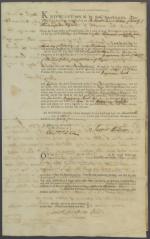
After James Wilson sells land in Pennsylvania (tract no. 5055) to Dr. Benjamin Rush on April 19, 1794, Dr. Rush sells that property to a Richard Stockton of New Jersey on May 28, 1794. John C.

Benjamin Rush signs this affidavit that attests that Albion Guest's payment certificate for service as a soldier is the property of Dickinson College. Guest's certificate, which is worth $44, is no. 74942 and dated July 1, 1784.

Dr. Benjamin Rush writes to James Orbison, the executor for the estate of William Thompson, and asks that Orbison pay an outstanding bill for medical expenses.
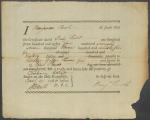
Benjamin Rush signs this affidavit that attests that Arthur [Gillas'?] payment certificate for service as a soldier is the property of Dickinson College. Arthur's certificate is no. 77395 and dated July 1, 1784.
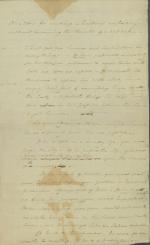
Benjamin Rush writes to his sister-in-law, Susan Stockton, with directions for making a husband unhappy without incurring the character of a bad wife.

Dr. Benjamin Rush writes to Dr. Ashbel Green about Dr. Muhlenberg's visit as well as the possibility of working with Robert Ralston. "I expect to see [Dr.

John Dickinson acknowledges the receipt of Benjamin Rush's pamphlet and mentions that he would only reenter Pennsylvania affairs to serve America.

A map of lands in Lycoming County, Pennsylvania that is owned by James Campbell, Benjamin Rush, and Jacob Rush. Henry Donnel created this copy of the map.

Benjamin Rush signs this affidavit that attests that Christopher Finnigan's payment certificate for service as a soldier is the property of Dickinson College. Finnigan's certificate is no. 75525 and dated July 1, 1784.


Benjamin Rush writes to Thomas Smith of Carlisle, Pennsylvania regarding efforts to raise funds for Dickinson, including a petition to the Pennsylvania legislature for additional financial support. Dr.

Benjamin Rush writes to an unidentified doctor and thanks him for his long letter as well as the enclosed newspaper clippings.
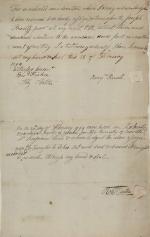
Benjamin Rush writes and signs this legal document, which transfers a deed to Joseph Priestley, Jr. Transcript included.
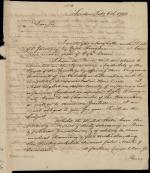
Statesman William Bingham writes Benjamin Rush and compares the conditions in England with those in the United States in terms of government, economics, and immigration.

Benjamin Rush writes to his wife, Julia Stockton Rush, regarding poetry, the division of land, and his medical essays. Transcript included.
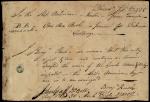
This customs declaration and receipt form, sworn and signed by Benjamin Rush, is for "One Box Books a present for Dickinson College."

William Kirkpatrick's ticket for Benjamin Rush's "Lectures upon the Institutes of Medicine and Clinical Cases" at the University of Pennsylvania in Philadelphia in 1794.
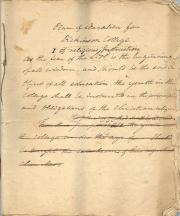
The papers of the Board of Trustees of Dickinson College, 1783-1833, include correspondence, reports, financial statements, printed materials, and legal documents, and have been arranged into seven series.
Series 1 – Membership contains correspondence regarding membership on the Board of Trustees, as well as a membership list, c1826.
Series 2 – Reports of the President consists of reports made to the Board by Presidents Nisbet, Davidson, and How.
Series 3 – General Business contains materials such as correspondence between trustees, mandamus to the faculty, and committee reports.
Series 4 – College Personnel includes correspondence to and from faculty members, including presidents.
Series 5 – Physical Plant contains land deeds and construction and service bills for the campus buildings.
Series 6 – Financial Affairs contains reports of the treasurer, subscription lists, and other financial materials.
Series 7– Publications contains printed materials such as college catalogues.
A fuller description of each series is given before each series inventory.
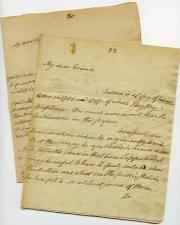
This collection is comprised of correspondence and legal papers reflecting the legal and political career of John Dickinson, statesman and president of the Supreme Executive Council of Delaware and Pennsylvania. The majority of the collection is comprised of correspondence from Dickinson to such prominent individuals as James Wilson, Caesar Rodney, and Benjamin Rush. The collection also contains financial papers and papers related to Dickinson's public duties, particularly to his duties as president of the Supreme Executive Council of Pennsylvania.

The Dickinsoniana Newspaper Collection consists of various newspapers acquired by the Library over the years. These items feature articles which concern mainly Dickinson College: happenings on campus, curriculum offerings, and doings of famous alumni such as James Buchanan and Roger Brooke Taney. The newspapers are arranged alphabetically by title and then chronologically; a description of the pertinent article, its location in the paper, and donor information are included in this inventory. In order to find newspapers dealing with particular individuals or events, a subject index has been included with the collection.

The collection consists of the papers of Charles Nisbet, first president of Dickinson College, and his family, particularly his son-in-law, William Turnbull. The majority of these papers is correspondence conducted between Nisbet and his daughter, and also between Nisbet and Lady Leven of Scotland. The business ventures of William Turnbull are reflected through legal, financial, and other miscellaneous documents; the collection's single artifact is Turnbull's leather wallet.